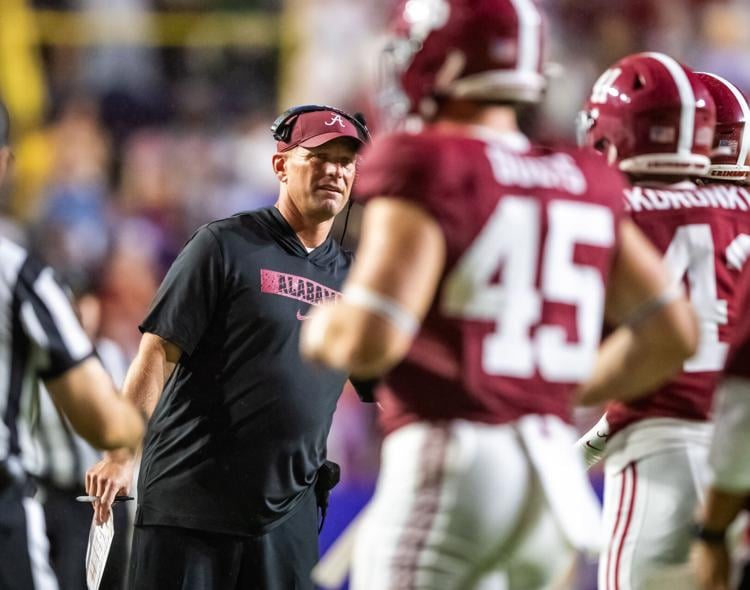“He Wasn’t Nick Saban — and That Was the Problem: What Really Happened Inside Alabama’s Locker Room During a Year of Quiet Doubts, New Leadership, and Shifting Allegiances”
When Nick Saban announced his retirement from coaching in January 2024, the college football world paused. The architect of Alabama’s dynasty—the man who brought six national championships to Tuscaloosa—was stepping away. His successor, Kalen DeBoer, arrived with an impressive résumé and the backing of university leadership.
But behind the scenes, inside the Alabama locker room, trust wasn’t immediate—and unity wasn’t automatic.
Now entering his second season, DeBoer has begun to open up about the challenges of following a legend, while Alabama players are starting to speak more candidly about the emotional and mental adjustment that came with the coaching transition. What emerges is a compelling narrative of uncertainty, growth, and the complex psychology of replacing greatness.
The Shadow of a Giant
Kalen DeBoer took over Alabama after a stellar run at Washington, where he led the Huskies to a national championship appearance. But walking into Tuscaloosa meant walking into Saban’s shadow—where every standard, every tradition, and every expectation had been built over 17 years of dominance.
“Last year was unique,” said Ty Simpson, a redshirt junior quarterback, during a media appearance at the Manning Passing Academy. “The greatest coach of all time is not there anymore, and this stranger comes in and is like, ‘Hey, we’re going to do it this way.’”
According to Simpson, many players didn’t fully trust DeBoer at the start of the 2024 season. The emotional weight of losing a mentor like Saban—someone who recruited and developed many of them—was harder to overcome than most fans or analysts realized.
A Season of Quiet Turbulence
Alabama’s 2024 season ended with a 9-4 record, placing them outside the Associated Press Top 10 for the first time since 2007. They finished No. 11 in the final College Football Playoff rankings, narrowly missing the 12-team field. While a respectable debut for most new coaches, it was a far cry from the standard set under Saban.
“We fell short of making the Playoffs,” DeBoer admitted during SEC Media Days. “It’s as simple as that… but I’m proud of the progression.”
Progress, yes—but also growing pains. The Crimson Tide lost three games by one score, and questions about identity, leadership, and chemistry loomed large throughout the year.
Players like Tim Keenan, a redshirt sophomore defensive lineman, acknowledged that buy-in wasn’t universal last season.
“If they’re not here now—no knock to them—but everyone here now believes in the system, believes in Coach DeBoer,” Keenan said.
In other words, the program underwent a quiet purge. Those who couldn’t adapt moved on. Those who stayed have now reportedly embraced the change.
Building Trust in Year Two
With Jalen Milroe off to the NFL, Simpson has emerged as the likely starter at quarterback. DeBoer also brought back Ryan Grubb, his former offensive coordinator at Washington and most recently of the Seattle Seahawks, to run Alabama’s offense.
“Everybody understands, ‘Hey, this is our guy. Coach Saban is not coming back in the door,’” Simpson said. “We’re going to make sure all our attention is on Coach DeBoer, and we’re going to do it his way.”
That shift in mindset could be the turning point for Alabama’s resurgence. For DeBoer, it’s not just about implementing schemes. It’s about inheriting a culture and slowly reshaping it without losing what made it great.
Learning from the Misses
Reflecting on last season’s close losses, DeBoer said his staff has worked hard to identify why the team struggled in high-pressure moments.
“Sometimes there are ups and downs that you have to go through,” he said. “But in the end, we’re going to take advantage of the failures we’ve had and be better because of it.”
For a program like Alabama, where failure is defined as anything short of a national title, learning from defeat isn’t a luxury—it’s a mandate.
The Road Ahead
As the 2025 season approaches, Alabama finds itself in unfamiliar territory: not the hunted, but the hunter. DeBoer’s second year will be about cementing his vision, solidifying leadership, and proving that the dynasty didn’t retire with Saban.
The locker room appears to have settled. Trust has been earned. But the real test comes on the field this fall.
Because in Tuscaloosa, only one question really matters: C
an Alabama still be Alabama—without Nick Saban?






















